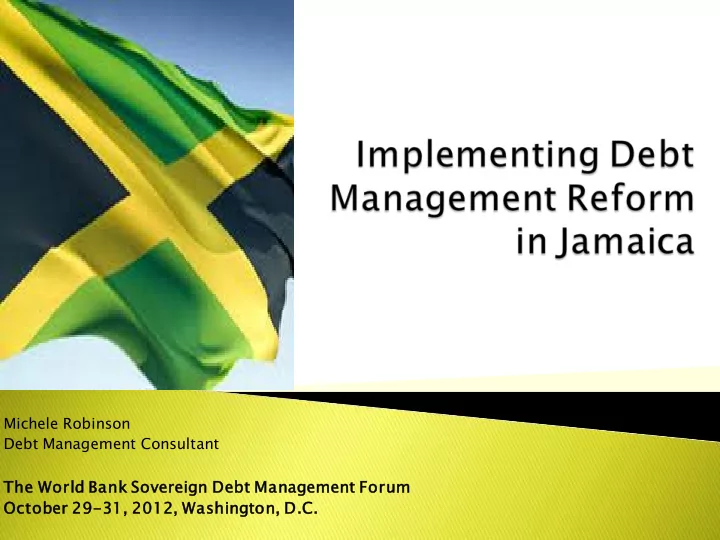

Michele Robinson Debt Management Consultant The W World B Bank S Sover erei eign D Deb ebt M Managem emen ent F Forum Octobe ber 2 29-31, 2 , 2012, W , Washington, D , D.C .C.
Debt Profile and Institutional Framework Debt Management Reforms Challenges and Obstacles Lessons Learned
Emerging Market countries Middle Income Caribbean Countries 160.0 140.0 120.0 100.0 80.0 60.0 40.0 20.0 - Market access country, speculative grade rating of “B-” Among most highly-indebted countries in the world Debt to GDP has exceeded 100% for better part of four decades, 128% at end 2011/2012 In 2011/12, debt servicing 54.6 % of budgetary expenditure, 115% of tax revenue Domestic debt comprises 55% of total debt and 70% of GDP Major restructuring with domestic debt exchange (the JDX) in 2010
Pluses Functioning debt management unit within the Ministry of Finance Regular publication of debt management strategy to Parliament Annual report on debt management operations Established debt management objectives Minuses Several laws governing debt management No mandatory reporting of debt management outcomes against strategic objectives/debt management strategy Debt management office organised by source of finance Debt management strategy did not consider array of borrowing options
Legislation Legislation aimed to clearly specify debt management objectives, promote good governance , provide for more strategic borrowing decisions Consolidation of several laws governing public debt management into single integrated debt law, the Public Debt Management Act (PDMA) Organisational Structure Aim of reform to strengthen government debt management operationally and strategically Complete overhaul of the debt management unit - new structure organised along functional lines Organisational structure approved in April 2011 - implementation began June 2011
Reform Objective - Strengthen public debt management and provide greater strategic direction to borrowing decisions Reformprocess began in early 2010 External Support Widespread support from the Technical assistance international community Needs assessment Commonwealth Secretariat Reform plan DFID (UK) Organisational reform IADB Guidance on debt legislation I MF/CARTA C Operationalising new structure The World Bank Financial support Internal Support Public Sector Transformation Unit
Legislation Reform Technical assistance - to develop legislation Working closely with Parliamentary counsel in drafting Building wide-based consensus – Government and Opposition Organisational Reform Technical assistance and funding Enlisting “champions” to lead the change Early communication with key stakeholders Early engagement of HR and Training divisions Formation of a high-level Steering Committee Change Management workshops/counselling
Legislation Reform Main challenges: Bill tabled in Parliament in July 2011 but has, to date, not yet been passed Contributory factors Lack of political will to push bill through Newly elected government during reform process Organisational Reform Main challenges: Difficulty in recruiting staff to the middle office Slow pace of overall recruitment Contributory factors Low remuneration offered in public sector Relatively low interest in middle office senior position Difficulty with applicants satisfying shortlisting criteria Difficulty with applicants passing recruitment and selection process Public service recruitment regulations and practices impede recruitment
Sustainable reform Ensure government’s commitment Understand the environment Engage key stakeholders early A “champion” is required External support is essential
“...successful reform is not an event. It is a sustainable process that will build on its own successes – a virtuous cycle of change.” Abdullah II
Recommend
More recommend